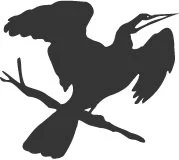
How Men Pray by Philip F. Deaver
Van K. Brock Florida Poetry Series (2005)
Philip Deaver's How Men Pray simultaneously breaks my heart and deeply comforts me. A man in one of these poems says, "I feel like I've had some sort of visitation"-- and that's just how I feel after reading the book in one sitting. The news here is life saving. -- David Huddle
The poems in How Men Pray are snapshots of the legendary America of promise and disappointment. They are the poems of an equilibrist, a storyteller whose sense of poetry is a mixture of colloquial address, irony, and tenderness toward our losses and our loneliness. -- Carol Frost
This very fine book was written for every mature man who has found himself at the far end of complacent middle-age. Sometimes as uneasy and brooding as fading Polaroids, other times vibrantly straight forward, the poems capture how our lives are clearly delineated only against the ghostly negatives of the past. Deaver does indeed know that "place in the new yard where the day lasts longest..." -- Mark Cox
How Men Pray is a book of dream and remembering, of the slow, shining way the past swallows us and we survive, almost. Here, there's a father's watch with blood on it, a sister's small pink dress, a mother's four weeks to live, a grandfather's magnifying glass which enlarges a lost world. Philip Deaver slips through such things, painful and treasured, and calls back to us. --Marianne Boruch
Your Mars Looming
Your Mars was looming before dawn this morning
at your west horizon of your overbig sky; from here on
it will fade. The planet was amber. Your silence prevailed.
All things seemed to observe the moment. Even the dog
paused to look, in dewy grass, elbow deep, at the edge
of the lake's flat black water. Your day was just beginning.
Yesterday at our same time Mars was higher
in a slightly brighter sky. The days are getting shorter.
When I first began watching, last month, longest days,
heat of summer, the moon passed over ahead of Mars;
but during the month Mars left it far behind, the moon
in its nightly phases, in a big cool orbit of its own,
and Venus and Saturn splayed and went their different ways
and while the big dipper kept its shape, it pivoted and twirled
like a kite hooked to Polaris which remained at your North
as if pinned there. What a living thing your night sky is.
In its hours between the light, we might think it passes
in formation. No. Your synchrony is far bigger than that.
The Train Along the Toe
At night on the Penland ridge in the second week,
I'm lonely again; from the loft
the cabin stretches away in all directions;
the stirring sounds isolate me -
of the mice skittering past my traps
in the cabinet beneath the sink,
of the nightbirds and wheezing crickets
in the llama field nearby, of the soaring mountain
wind lifting through the pine stand;
but then, 3:28, the train
loaded down with gravel labors through, pulling
for a while, then on the downhill holding
back, the air brakes' unworldly song bouncing
off the flat-flowing river Toe and rising up a dark
hillside of shadow pine and moon poplar.
I lie near the window, the candle out,
my face as close to the screen as I can get it.
I pray for sleep before the silence comes again.
The last car, still far away, is rumbling up the hill and
rounding the curve from Spruce Pine to Penland Post,
but the engine's whistle, far in the future, is calling
already to Newdale bridge and Burnsville crossing.
I breathe in the interrupted air.
I'm calling forward, too. "I'm up here!" I shout
into the dark of my new dream, and I am.
Name Recognition
I have a persistent image of the past
as a grave we stare up out of
so we can easily see the sky
and the clouds passing in their varied moods -
but old friends, in their separate holes,
cannot see us;
so there's no real sadness
that you didn't remember my face
because for me the past is a death already
but I'm glad you remembered my name.

